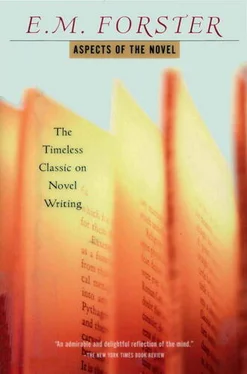Immediately after the sermon, Ishmael makes a passionate alliance with the cannibal Queequeg, and it looks for a moment that the book is to be a saga of blood-brotherhood. But human relationships mean little to Melville, and after a grotesque and violent entry, Queequeg is almost forgotten. Almost—not quite. Towards the end he falls ill and acoffin is made for him which he does not occupy, as he recovers. It is this coffin, serving as a life-buoy, that saves Ishmael from the final whirlpool, and this again is no coincidence, but an unformulated connection that sprang up in Melville's mind. Moby Dick is full of meanings: its meaning is a different problem. It is wrong to turn the Delight or the coffin into symbols, because even if the symbolism is correct, it silences the book. Nothing can be stated about Moby Dick except that it is a contest. The rest is song.
It is to his conception of evil that Melville's work owes much of its strength. As arule evil has been feebly envisaged in fiction, which seldom soars above misconduct or avoids the clouds of mysteriousness. Evil to most novelists is either sexual and social or is something very vague for which a special style with implications of poetry is thought suitable. They want it to exist, in order that it may kindly help them on with the plot, and evil, not being kind, generally hampers them with a villain—a Lovelace or Uriah Heep, who does more harm to the author than to the fellow characters. For a real villain we must turn to a story of Melville's called Billy Budd. [7] Only to be found in a collected edition. For knowledge of it, and for much else, I am indebted to Mr. John Freeman's admirable monograph on Melville.
It is a short story, but must be mentioned because of the light it throws on his other work. The scene is on a British man-of-war soon after the Mutiny at the Nore—a stagey yet intensely real vessel. The hero, a young sailor, has goodness—which is faint beside the goodness of Alyosha; still he has goodness of the glowing aggressive sort which cannot exist unless it has evil to consume. He is not aggressive himself. It is the light within him that irritates and explodes. On the surface he is a pleasant, merry, rather insensitive lad, whose perfect physique is marred by one slight defect, a stammer, which finally destroys him. He is "dropped into a world not without some man-traps, and against whose subtleties simple courage without any touch of defensive ugliness is of little avail; and where such innocence as man is capable of does yet, in a moral emergency, not always sharpen the faculties or enlighten the will." Claggart, one of the petty officers, at once sees in him the enemy—his own enemy, for Claggart is evil. It is again the contest between Ahab and Moby Dick, though the parts are more clearly assigned, and we are further from prophecy and nearer to morality and common sense. But not much nearer. Claggart is not like any other villain.
Naturally depravity has certain negative virtues, serving it as silent auxiliaries. It is not going too far to say that it is without vices or small sins. There is a phenomenal pride in it that excludes them from anything—never mercenary or avaricious. In short, the character here meant partakes nothing of the sordid or sensual. It is serious, but free from acerbity.
He accuses Billy of trying to foment a mutiny. The charge is ridiculous, no one believes it, and yet it proves fatal. For when the boy is summoned to declare his innocence, he is so horrified that he cannot speak, his ludicrous stammer seizes him, the power within him explodes, and he knocks down his traducer, kills him, and has to be hanged.
Billy Budd is a remote unearthly episode, but it is asong not without words, and should be read both for its own beauty and as an introduction to more difficult works. Evil is labelled and personified instead of slipping over the ocean and round the world, and Melville's mind can be observed more easily. What one notices in him is that his apprehensions are free from personal worry, so that we become bigger not smaller after sharing them. He has not got that tiresome little receptacle, aconscience, which is often such a nuisance in serious writers and so contracts their effects—the conscience of Hawthorne or of Mark Rutherford. Melville—after the initial roughness of his realism—reaches straight back into the universal, to a blackness and sadness so transcending our own that they are undistinguishable from glory. He says, "in certain moods no man can weigh this world without throwing in a something somehow like Original Sin to strike the uneven balance." He threw it in, that undefinable something, the balance righted itself, and he gave us harmony and temporary salvation.
It is no wonder that D. H. Lawrence should have written two penetrating studies of Melville, for Lawrence himself is, as far as I know, the only prophetic novelist writing today—all the rest are fantasists or preachers: the only living novelist in whom the song predominates, who has the rapt bardic quality, and whom it is idle to criticize. He invites criticism because he is a preacher also—it is this minor aspect of him which makes him so difficult and misleading— an excessively clever preacher who knows how to play on the nerves of his congregation. Nothing is more disconcerting than to sit down, so to speak, be fore your prophet, and then suddenly to receive his boot in the pit of your stomach. "I'm damned if I'll be humble after that," you cry, and so lay yourself open to further nagging. Also the subject matter of the sermon is agitating—hot denunciations or advice—so that in the end you cannot remember whether you ought or ought not to have a body, and are only sure that you are futile. This bullying, and the honeyed sweetness which is a bully's reaction, occupy between them the foreground of Lawrence's work; his greatness lies far, far back, and rests, not like Dostoevsky's upon Christianity, nor like Melville's upon a contest, but upon something aesthetic. The voice is Balder's voice, though the hands are the hands of Esau. The prophet is irradiating nature from within, so that every colour has a glow and every form a distinctness which could not otherwise be obtained. Take a scene that always stays in the memory: that scene in Women in Love where one of the characters throws stones into the water at night to shatter the image of the moon. Why he throws, what the scene symbolizes, is unimportant. But the writer could not get such a moon and water otherwise; he reaches them by his special path which stamps them as more wonderful than any we can imagine. It is the prophet back where he started from, back where the rest of us are waiting by the edge of the pool, but with a power of re-creation and evocation we shall never possess.
Humility is not easy with this irritable and irritating author, for the humbler we get, the crosser he gets. Yet I do not see how else to read him. If we start resenting or mocking, his treasure disappears as surely as if we started obeying him. What is valuable about him cannot be put into words; it is colour, gesture and outline in people and things, the usual stock-in-trade of the novelist, but evolved by such adifferent process that they belong to a new world.
But what about Emily Brontë? Why should Wuthering Heights come into this inquiry? It is a story about human beings, it contains no view of the universe.
My answer is that the emotions of Heathcliffe and Catherine Earnshaw function differently to other emotions in fiction. Instead of inhabiting the characters, they surround them like thunder clouds, and generate the explosions that fill the novel from the moment when Lockwood dreams of the hand at the window down to the moment when Heathcliffe, with the same window open, is discovered dead. Wuthering Heights is filled with sound—storm and rushing wind—a sound more important than words and thoughts. Great as the novel is, one cannot afterwards remember anything in it but Heathcliffe and the elder Catherine. They cause the action by their separation: they close it by their union after death. No wonder they "walk"; what else could such beings do? Even when they were alive their love and hate transcended them.
Читать дальше












